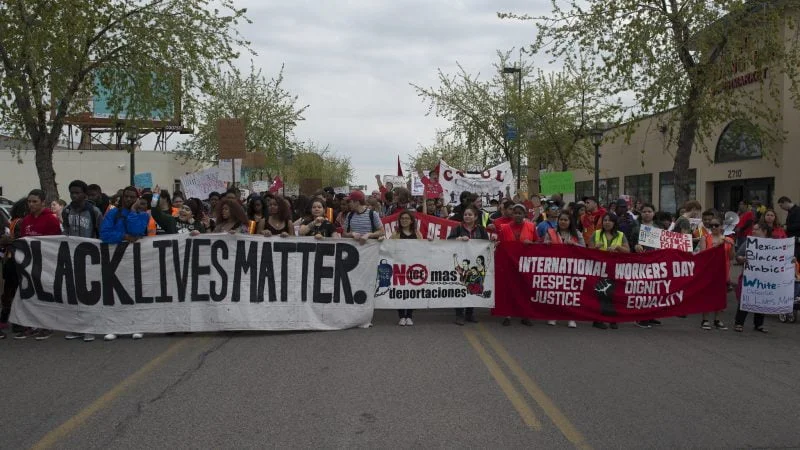
In late January, Marathon oil refinery workers in St. Paul Park, MN called a 24-hour strike in response to the company’s contract proposal, which would subcontract certain union jobs to the lowest-bidding non-union companies. Marathon retaliated by locking the workers out despite their being willing to return to work. These workers have now been on the picket line for two months, and neither side shows any sign of backing down.
The workers, members of Teamsters Local 120, are concerned with workplace safety at the refinery and its effect on the surrounding area. They demand the retention of existing union operators and mechanics, which are essential for the refinery’s safety. Union workers must complete apprenticeships while logging a specified number of hours before they can fulfill certain positions, while the requirements for non-union refinery workers are less stringent. Additionally, non-union workers generally have less job security and are under more pressure not to disclose workplace hazards for fear of losing their jobs.

There is a historical precedent for their concerns. The 2005 Texas City refinery explosion killed 15 workers, severely injured 180 others, and blew out buildings’ windows within a ¾-mile radius of the refinery. More recently, a 2018 refinery explosion in Superior, WI, injured 36 workers.
The Marathon complex uses the same refining method as the Superior facility but refines over twice as much oil. The process involves using hydrofluoric acid, which is highly flammable and causes severe burns if exposed to skin. Despite these dangerous conditions, Marathon is currently eliminating full-time in-house firefighting and now relies on on-call employees. Only a few responders live within an hour of the refinery.
St. Paul Park city officials have also expressed concern over this, as the local fire departments of St. Paul Park and surrounding towns will likely have to respond to Marathon’s fire emergencies. The municipal firefighters are also on-call and only receive refinery-specific training a few times a year, at best. Refinery workers say that the local fire departments are wholly underprepared for refinery emergencies. With the Teamsters locked out and on the picket line, contractors of questionable competency are now operating the plant. Refinery disasters are infrequent but extremely dangerous, and the current situation only increases the chances of such a disaster. For their own sake and the sake of those living nearby, the Teamsters know that they need to beat the bosses’ lockout—but what will it take?
The dictates of the picket line are currently determined by what the courts deem is “reasonable.” This means that a restricted number of striking workers can picket scab workers and oil trucks for around a minute before being forced to let them through. The police stand by, monitoring the workers to ensure that they don’t overstep these bounds.
From the perspective of those trying to win a strike, this is entirely unreasonable since the entire point of a strike is to stop production. A secondary tactic could include the picketing of Marathon-owned Speedway gas stations to target the company’s profits. However, the Teamsters are reluctant to call for an explicit boycott of Speedway gas for fear of legal retaliation since secondary boycotts are illegal under the Taft-Hartley law. Nonetheless, the Teamsters have benefited from generous outside support in the form of firewood, food, and other supplies from unions, small businesses, and individuals, and many have also joined them on the picket line.
The Teamsters have a strike fund, adequate supplies, outside union support, and the tenacity to not back down. It seems that they have everything they need to win the strike. However, if Marathon can continue production, this strike becomes a war of attrition. In the long run, this is more difficult for the workers who have fewer resources than Marathon. To win, the union leadership would need to challenge the bosses’ right to continue production. If the union leaders had this approach, mass picketing would be required to effectively stop production.

Labor could also link up with the Black Lives Matter movement, which surged onto the streets last year in the largest mass movement in US history. Even if only a fraction of that movement joined the picket lines, production could be brought to a grinding halt. The labor unions that backed BLM could appeal to the millions involved in that movement to aid them in their struggle today. In addition, active participants in BLM who assist the Teamsters in their battle would likely win over those workers who were skeptical or even opposed to last summer’s movement.
Indeed, other unions could also aid in defying the courts and police to establish mass pickets and even go on strike in solidarity. The Teamsters also represent UPS workers—imagine how quickly pressure could be brought to bear on Marathon if the whole of UPS was shut down in a solidarity strike!
But Taft-Hartley not only outlaws secondary boycotts, it also criminalizes sympathy strikes. During a strike, these anti-labor laws come to light, and the capitalist state, with its courts and cops, shows its deep-seated bias in favor of the owning class. The workers need to take these legal fights out of the bosses’ territory in the courts and fight them in streets where the workers themselves can challenge the law’s legitimacy. However, this would require a combative class-struggle union leadership to pursue such a strategy involving solidarity strikes and mass picketing. Labor leaders should note the many “illegal” teacher strikes that erupted in 2018–19, most of which were overwhelmingly successful.
It is essential to recognize that management may not want to further provoke workers with litigation when they are already acting en masse. Utilizing these tactics would be a significant change from the labor leaders’ current approach, but it would dramatically shift the balance of power in favor of the workers, and this struggle could be won in a matter of days.
Members of the IMT in the Twin Cities have joined the picket lines to support the Marathon workers, providing firewood and hand warmers when temperatures dropped below zero. We fully support the demands of Local 120. In Toronto, the Molson brewery workers, working with our Canadian comrades, sent a video expressing solidarity with the Marathon workers. IMT members and striking stagehands in Connecticut have also expressed solidarity with the Minnesota Teamsters. It is the goal of the IMT to forge alliances between workers across industries, companies, and borders as we fight for a socialist program that will bring an end to putting profits before lives. Ultimately, Marathon workers, along with the broader working class, should democratically decide what to produce and how to produce it while ensuring everyone’s safety and a high quality of life for all.

